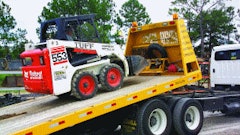A longtime industry friend contacted me a couple days ago to tell me the company he works for - one of the most progressive construction firms in the Northeast - is closing its doors after 50+ years in business. The same day, I learned that a sizable, family-owned construction management firm in the Southwest won't be making it past the fourth generation.
Such news is a sad reminder of what can happen if you fail to plan ahead to insulate your business against economic risks. It is also a cautionary tale that even well-established companies can fail if management doesn't heed the warning signs and take action quickly.
If your company is struggling, it need not be another victim of the weak economy. And if it's well leveraged, it may still benefit from a review of policies and procedures to make sure it doesn't falter in the future.
Start by getting your house in order. It's essential for any business to maintain good "housekeeping" practices. Establish realistic goals and budget accordingly; understand project costs and bid realistically; bill customers in a timely manner to keep cash flowing in, etc. (Additional housekeeping tips can be found in the Running Your Business section of www.ForConstructionPros.com.) Get outside help if you're struggling to keep finances under control.
If you do find your business faltering, seek financial guidance, and communicate openly with your banker and suppliers. They have a stake in keeping your business afloat, so they may be willing to come up with terms to help you meet your debt obligations and still sustain sufficient working capital.
Pound the streets - hard. The work is out there; you just need to find it, then make sure your company is the one that gets it. Stay in regular contact with clients, and keep your eyes and ears open for any new opportunities.
Cut costs where you can, but don't cut too deep. The adage that "a company is only as good as its people" holds true even in a bad economy. Make sure you don't lose valuable personnel assets by cutting too deeply within your organization. Consider cross training high-value employees; it will give them added job security, and enable you to do more with fewer people.
Evaluate your fleet to see if any units are under utilized, or if you may be able to use rental to eliminate certain machines. Consider investing in equipment tracking technology to better manage logistics and get a "truer" picture of equipment operating time. It calls for an initial investment, but can quickly pay for itself.
When selling units, consider online auction services to attract potential buyers in other areas of the U.S. or even outside of the country. This can often help to net better prices due to heightened competition for used machines.
Religiously adhere to preventive maintenance. The last thing you need is a major repair bill and downtime. Make sure scheduled PM is not neglected so you can avoid any nasty surprises.
Continue to explore new technologies. You may find it hard to imagine investing in new technology right now, but there is a lot of exciting stuff out there to cut operating costs and boost productivity. Stay abreast of what's available, then take advantage of low interest rates, tax breaks and dealer incentives as your budget allows.




























